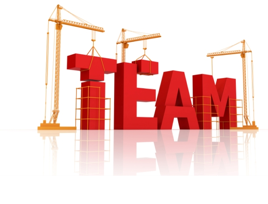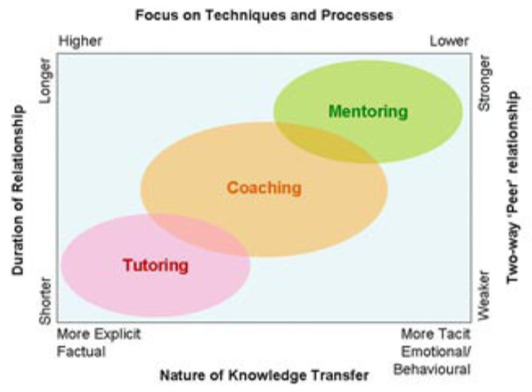by Lynda Bourne
 If you are a leader, you are responsible for building the team you lead!
If you are a leader, you are responsible for building the team you lead!
One of the key stakeholder management roles fulfilled by effective team leaders and project managers is helping their team members grow and improve.
Remember, you cannot be successful as a leader unless your team succeeds in achieving its objectives! And helping team members develop their capabilities has two paybacks – helping people develop their skills and capabilities is a great motivator plus having more highly skilled, capable and motivated team members gets more work done. A win-win outcome that can return big dividends for a relatively small investment.

As a leader you have four basic options to choose from: teaching, coaching, counselling and mentoring. Understanding the differences and selecting the right option for each situation helps you help your team to be successful.
Tutoring / Teaching
The focus of teaching is to impart knowledge and information through instruction and explanation. And the goal for the student is to acquire a skill or pass a test. The learning has a one-way flow and the relationship between teacher and student is low. These days’ web tools can be used to deliver teaching on demand.
Teaching is effective for: Simple knowledge transfer. This can be facilitated by external experts delivering focused training sessions or asking a skilled team member to do the teaching. Your job is to make sure the right training gets to the right people at the right time.
Coaching
Coaching usually focuses on task and performance. The role of the coach is to give feedback on observed performance and this usually happens at the workplace. The coach is likely to set or suggest goals for the learner and measure performance periodically as the learner develops new skills. This needs a good working relationship between learner and coach.
Coaching is effective for driving improved performance. Every elite sports team has a committed coach. As a team leader, you need to take this role seriously if you want to lift your team’s skills and performance to the elite level!
Counselling
The counsellor uses listening and questioning to build self-awareness and self-confidence in the client. The goal is to help the person deal with something they are finding emotionally difficult. Once again learning is one-way and the closeness of the relationship low.
Counselling is effective for: Helping a team member deal with personal difficulties. Again, in appropriate circumstances don’t be afraid to bring a skilled external counsellor.
Mentoring
Mentoring is a partnership between two people and emphasises a mutuality of learning. The role of the mentor is to build capability and help the learner discover their personal wisdom by encouraging the learner to work towards career goals or develop self-reliance. Mentors may draw on a number of approaches (teaching, coaching and counselling) to help mentees achieve the goals they’ve set for themselves. Because the relationship is mutually beneficial strong bonds are often forged which often outlast the mentoring relationship. However, because the mentoring relationship is focused on the mentee’s personal goals it should be kept separate from direct lines of management control; it is very difficult to mentor a direct report.
Mentoring is effective for building the capability of the learner. Carefully select the people in which to invest the effort and emotion of building a relationship. If it’s not right for you, help your team member find the right mentor
Selecting the best option
Within your team;
-
Use teaching for simple knowledge transfer, there’s no harm in bringing in expertise or asking a skills team member to do the teaching.
-
Use coaching to drive improved performance – every elite sports team has a committed coach, as a team leader you need to take this role seriously!
-
Use counselling one-on-one to help a team member deal with personal difficulties; again don’t be afraid of bringing in external assistance from a skilled councillor.
-
Use mentoring to help build the capability of the mentee. You need to carefully select the people to invest your emotions in building a relationship with, if it’s not right for you, help the person find the right mentor for them.
The difference between coaching and mentoring is largely about focus and goal setting. Coaching focuses on improving performance, mentoring on building capability. The coach usually sets goals for the learner, whereas in mentoring the learner sets their own goals, and to help achieve these goals, a mentor may draw on a number of approaches: teaching, coaching, and counselling.
The other significant difference between mentoring and the other forms of development is the relationship forged between two people. Good mentors offer the learner the right kind of help and support and adapt to the needs of the learner – so what makes a good mentor?
What Makes a Good Mentor?
The attributes and skills of a good mentor include:
1. Being committed to learning and helping others learn
2. Being a good listener
3. Displaying empathy
4. Building rapport
5. Encouraging the learner to speak
6. Observation and reflection
7. Providing constructive challenges
8. Being self-aware and understands others
9. Has intuitive wisdom from life experience
10. Helping the learner reshape their thinking
11. Is politically or professionally savvy
12. Shares experiences
13. Steps back from the detail
14. Manages the relationship and not the goals
15. Offers friendship
Finally, the mentor will keep the relationship confidential. What is said between mentor and mentee is confidential and never shared with others except in very special circumstances (See more on Mosaic’s mentoring options).
The power of coaching
Employees want a great deal more coaching than they receive. When leaders take the time to coach their team effectively, the results can be impressive. How Much Difference Does Coaching Make? Jack Zenger suggest effective coaching will generate:
- Up to 8 times higher levels of employee engagement and commitment!
- Over 3 times more willingness to “go the extra mile” for the team or organization
- Up to 2.5 times higher levels of job satisfaction
- Up to 2 times higher ratings of supervisor effectiveness
- Only half as many employees thinking about quitting
Leading to dramatically higher levels of client service and satisfaction, and we know that engaged employees are a key ingredient to creating a high performance team.
Summary
However you choose to develop in your team members, the investment is worthwhile. An empowered, motivated and skilled team is the best underpinning you can have in your quest to be a successful leader.





